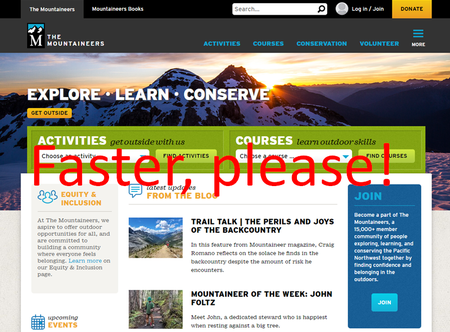
In summer 2022, members reported that, at times, our website was slow to respond and was experiencing 503 or 502 timeout errors. We worked to improve our website's performance in five phases. We know how important our website is to volunteers and member alike, and we have been working hard to improve its speed and reliability. We appreciate your patience as we worked through these improvements.
Website Performance Improvement Phases
Phase 1
Completed July 2022. We implemented nine items aimed at improving our website’s performance, three more than we had previously identified. They have resulted in a modest increase in our website’s speed/response time, and significantly reduced, if not nearly eliminated, 502 and 503 "timeout" errors.
Phase 2
Completed August-September 2022. We migrated/updated our core content types from archetype to dexterity type. While it will not directly lead to any website performance improvements, this was an important prerequisite step for other updates that give a significant website performance increase.
Phase 3
Completed February 2023. We migrated our web forms from PFG (PloneFormGen) to EasyForm. Web forms include feedback surveys, leader applications, incident reports, etc. Like migrating our core content types, this didn't directly lead to website performance improvements but was an important prerequisite step for Phase 4 improvements that give a significant website performance increase.
Phase 4
Completed March 2023. We upgraded our website platform from Plone 5.1 to 5.2 and Python 2 to 3, and updated our web server to the latest architecture and operating system. These are the upgrades that bring the most significant improvements to our website performance, and these updates were not possible without first completing Phases 2 & 3.
Phase 5
We are actively reviewing benchmarking statistics and fine tuning our web server and website's performance after launching the updates in Phase 4.
Website Performance Improvement Metrics
Since launching the Plone and Python upgrades to our website, we have measured significantly increased performance. Below are three measures that we reviewed:
- For the period seven days after launch, the average backend server response time was 301 miliseconds (ms) compared to the period from March 15-21 where it was 712 ms, more than twice as fast.
- The primary Google Analytics site performance metric is the "Average Server Response Time." Comparing the period from April 4-10 to March 21-27, there was a 59% reduction in those response times (less is good!). The data available is relatively sparse, with only 910 page views that included timing metrics during that period, but the improvement is dramatic.
- We measured response time during a test of search on our website without the upgrades just before launch and and again after with the upgrades. The response time on the upgraded test instance was 170 ms for 8 concurrent requests compared to 587 ms on our live website without the upgrades. This practical tests shows that we can expect a much faster website and better performance with the Plone and Python upgrades.
We understand how important the website is to our community and will continue to monitor it to ensure it performs well and is virtually error-free.
Learn More
Interested in learning more about our technology and infrastructure? You can read all of our related blogs on our Technology Blog. We especially encourage you to read How We Prioritize Technology Feedback and Projects, and then check out our feedback website to see what else we're working on.
Add a comment
Log in to add comments.FYI - the "How We Prioritize Technology Feedback and Projects" link at the bottom results in a 404.
Hi Matt: Thanks for letting us know. That was a bad link that is now fixed.
Thanks, Jeff. Happy to hear the molasses is thinning.
 Jeff Bowman
Jeff Bowman